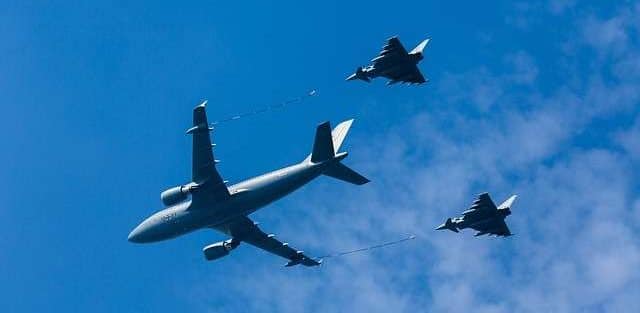Aerial Refueling

Aerial refueling is the process of transferring fuel from one aircraft to another during flight. This procedure is most commonly used by the military. In theory, this practice could be also be used to assist long range jet charters, but this would fly directly in the face of air charter safety. The safe coordination of charter flights—whether they’re short hops or transcontinental missions—is largely based on risk management. Using aerial refueling to resupply long range jet charters in midair would involve substantial risk.
Separation Rules Are There for a Reason
For starters, the Federal Aviation Administration (FAA) requires civil air carriers to maintain safe separation levels when flying in the same controlled airspace. In order for a refueling plane to perform its duty, it would need to fly well within those established boundaries. Additionally, aerial refueling entails significant logistical challenges that make it further prohibitive to the general aviation community. It also requires a considerable amount of training before a military pilot can successfully perform this procedure. Lastly, aerial refueling is neither efficient, nor cost-effective. One of the primary reasons the military uses it is to gain tactical advantages when conducting operations. That comes at a cost:
- Planning and executing difficult logistics
- Consuming significant fuel resources
- Specialized aircraft, crew and equipment
In other words, it wouldn’t help improve the economy of long range jet charters.
Aerial refueling is the process of transferring fuel from one aircraft to another during flight. This procedure is most commonly used by the military. In theory, this practice could be also be used to assist long range jet charters, but this would fly directly in the face of air charter safety. The safe coordination of charter flights—whether they’re short hops or transcontinental missions—is largely based on risk management. Using aerial refueling to resupply long range jet charters in midair would involve substantial risk.
Separation Rules Are There for a Reason
For starters, the Federal Aviation Administration (FAA) requires civil air carriers to maintain safe separation levels when flying in the same controlled airspace. In order for a refueling plane to perform its duty, it would need to fly well within those established boundaries. Additionally, aerial refueling entails significant logistical challenges that make it further prohibitive to the general aviation community. It also requires a considerable amount of training before a military pilot can successfully perform this procedure. Lastly, aerial refueling is neither efficient, nor cost-effective. One of the primary reasons the military uses it is to gain tactical advantages when conducting operations. That comes at a cost:
- Planning and executing difficult logistics
- Consuming significant fuel resources
- Specialized aircraft, crew and equipment
In other words, it wouldn’t help improve the economy of long range jet charters.







